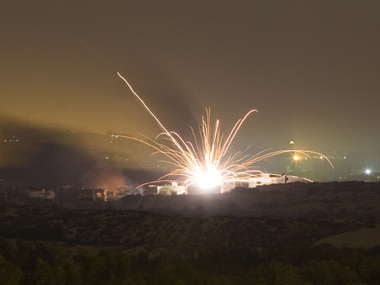In the last two weeks, the Gaza conflict has escalated from a search operation to find three Israeli teens kidnapped from West Bank to a full blown invasion by Israel, which has claimed 600 lives so far. Even as Israel continues to mount its punishing offensive against Hamas, the rising civilian death toll has earned the ire of the world – even an anit-Israel hot mic gaffe from the US secretary of state John Kerry. But the Indian government has remained studiously noncommittal, refusing to take a clear stance on Gaza, even at the recent BRICS summit. “Paragraph 38 of the Fortaleza Declaration blabbers on and on about Palestine, but it neither condemns Israel nor calls for a ceasefire. Modi and External Affairs Minister Sushma Swaraj take convenient cover behind that,” Congress leader Mani Shankar Aiyar writes in a scathing editorial in the Indian Express. [caption id=“attachment_1623907” align=“alignleft” width=“380”]  Picture of Israeli ground assault in Gaza. Reuters image[/caption] For three weeks, violence has been raging in Gaza, as the Indian government, led by prime minister Narendra Modi has both–failed and refused–to take a stand on an important global issue. Aside from generic assurances of support and repetitive calls for ceasefire, the government seems curiously detached about what is now being termed the worst flare up between Israel-Palestine in the recent years. Even though, as Aiyar writes, nearly eight lakh expatriate workers are making their living in the region, the government refused to discuss the issue in the Rajya Sabha and relented only after repeated walkouts by the opposition. Finally, when the discussion did take place, Foreign Minister Sushma Swaraj refused to offer any clarity about New Delhi’s position on the Israeli airstrikes that are now drawing global outrage. Aiyar argues that this wishy-washy attitude toward Palestine is especially unfortunate give the role India played when the future of Palestine was being decided at the end of the British mandate:
“While the West and the Soviet Union were united in their demand that Palestine be partitioned to create a sovereign homeland for the Jews, India, itself under the shadow of a looming, blood-soaked Partition, took the lead in arguing for a single federal state in which there would be two autonomous Jewish and Arab regions, but with a common central government democratically elected by all the citizens of a common state.”
The foreign policy stance which Aiyar cites is diametrically opposite to two-state solution that India has signed on to at the BRICS summit in Brazil recently. The Fortaleza Declaration says:
We call upon Israel and Palestine to resume negotiations leading to a two-State solution with a contiguous and economically viable Palestinian State existing side by side in peace with Israel, within mutually agreed and internationally recognized borders based on the 4 June 1967 lines, with East Jerusalem as its capital. We oppose the continuous construction and expansion of settlements in the Occupied Palestinian Territories by the Israeli Government, which violates international law, gravely undermines peace efforts and threatens the viability of the two-State solution.
But the two-state solution is unlikely to work, argues Aiyar, due to the Israeli encroachment of Palestinian land. “Israel, with all the cards in its hands, has encroached so far into Palestinian territory as to have reversed the shares originally intended, from 95 per cent for the Arabs and 5 per cent for the Jews to 95 per cent for Israel and 5 per cent for Palestine,” Aiyar argues. Further, he cites an example of how the Palestinians assumed they would be handed an independent state when they pushed for the two-state solution under the 1992 Oslo accords, the first time that both side came together to a negotiating table. The accord, which gave the Palestinians an interim self-government and created the Palestinian National Authority to administer the territory, may have seemed like independence but it wasn’t, the piece says. “When I then argued that it was not a state but merely panchayati raj in Gaza, I was accused of trying to be more Arab than the Arabs. But ultimately the truth dawned, and the Palestinians realised they had been tricked into returning from Tunisia to Gaza, where they were locked up and effectively isolated from the world,” Aiyar writes. Read more here.


)

)
)
)
)
)
)
)
)



